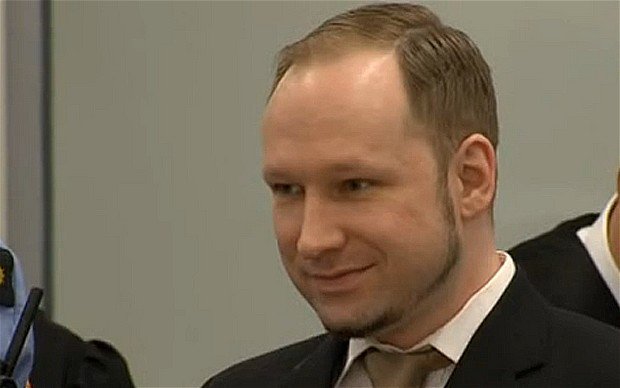
The trial of Anders Behring Breivik, the man accused of killing 77 people in bomb and gun attacks in Norway last July, has been adjourned while the court decides if a lay judge should be dismissed for bias.
The court heard that one of the lay judges in the case wrote last July that Anders Behring Breivik should face the death penalty.
When the trial resumes, Anders Breivik will read out a prepared statement.
He admits a car bombing in Oslo and attacking a youth camp.
However, Anders Breivik has pleaded not guilty to acts of terror and mass murder, claiming he had acted to protect Norway from multi-culturalism and Islam.
Anders Breivik, 33, has also said that he does not recognize the court.
Lawyers in the case have asked for the judge to be dismissed and the court was adjourned for 30 minutes to decide what action to take.
A lay judge is an ordinary member of the public who forms part of the judgement panel. If the judge is dismissed, there are two possible replacements who were observing proceedings yesterday and who could step in to allow the trial to continue as scheduled.
As he entered the courtroom, Anders Breivik smiled and, as he did on Monday, gave a far-right closed-fist salute before he sat down. This is the first time that Anders Breivik will be able to present his case in person.

Anders Breivik’s defense team has already warned that many Norwegians will find his testimony upsetting.
Instead of expressing remorse, Anders Breivik is expected to say he regrets not having killed more people.
On Monday, prosecutors played harrowing recordings of the events and described the fate of each victim in detail.
Throughout the evidence Anders Breivik remained emotionless, although he broke down weeping when the court played a 12-minute anti-Islam video which he had posted online on the day of the carnage.
Anders Breivik’s lawyer, Geir Lippestad, later said that his client appeared to have cried over feelings that his attacks were “cruel but necessary… to save Europe from an ongoing war”.
Geir Lippestad said he understood that victims’ families were worried Anders Breivik would use his trial as a pulpit.
“On the other hand – and this is important – he has a right to explain himself, a fundamental right under Norwegian law and a human right,” he added.
Parts of the trial are being broadcast on television, although the court will not allow Anders Breivik’s testimony or that of his witnesses to be broadcast.
Anders Breivik detonated a bomb in a van parked outside government offices in Oslo on 22 July, killing eight people.
He then travelled to Utoeya where, dressed as a police officer, he shot dead a further 69 people who were attending a youth camp run by the governing Labour party.
Survivors and relatives of the victims gasped as previously unreleased footage was shown in court of people walking towards Anders Breivik’s parked van as it exploded outside the government block.
The court also heard Anders Breivik’s calls to police offering to give himself up.
“I have completed my operation and I want to surrender,” Anders Breivik said.
One of the questions at the heart of this trial, which is expected to last for 10 weeks, is Anders Breivik’s mental state.
He was found insane in one examination, while a second assessment made public last week found him mentally competent.
If the court decides he is criminally insane, Anders Breivik will be committed to psychiatric care; if he is judged to be mentally stable, he will be jailed if found guilty.
If jailed, he faces a sentence of 21 years which could be extended to keep him behind bars for the rest of his life.
The courtroom has been specially built for the trial to accommodate more than 200 people.
Glass partitions have been put up to separate the victims and their families from Anders Breivik.
[youtube 0oDDSxRLrcU]